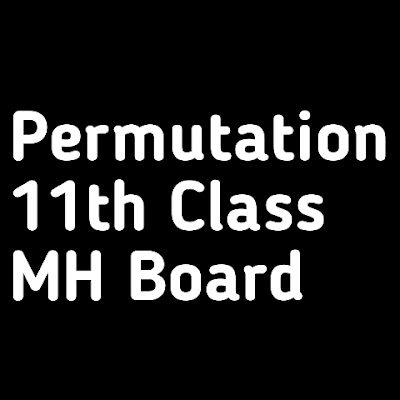PERMUTATION
→A permutation is an arrangement, in a definite order of a number of objects taken some or all at a time
 |
| PERMUTATION Class 11th Maharashtra Board |
Permutations when all objects are distinct Theorem 1.8
The number of permutation of n distinct objects taken r (r<=n) at a time without repetition is
n×(n-1)×(n-2)×.....×(n-r+1) =nPr= n!/(n-r)!
Example: How many different ways are there to arrange letters of the word W,O,R,L,D? How many of these arrangements begin with the letter are ? How many arrangements can be made taking three letters at a time
Solution: The word world has 5 letters W,O,R,L,D. these can be arranged among themselves in five=5!=120 factorial different ways. If an arrangement begins with our, the remaining four letters can be arranged among themselves in 4p4 equal to four factorial equal to 24 ways the number of arrangements of 5 letters taken 3 at a time, is $5P3=\frac{5!}{2!}$=60
Example : How many 3 digits number can be formed from the digits 2 4 5 6 7 if no digit is repeated?
Solution:
Every arrangement of digits gives a different number. Therefore then the problem is to find the number of arrangements of five digits taken two at a time this is given by
`5P3 =\frac{\text{5!}}{\text{2!}}`=60
Example: For how many numbers can be formed with the digits 3,4,6,7,8 taken all at a time? Find the sum of all such numbers.
Solution:
The five digits can be arranged in 555 equal to 5 equal to 120 days now, consider any one of the given digits se 3 suppose the digit 3 is in the units place. The other four digits can be arranged in four by four equal to four factorial equal to 24 ways to form numbers that have three in the units place. This shows that 24 out of the 120 numbers have three in the units place
Similarly, each of the other four digits in the units place in 24 of the 120 numbers.
The num the sum of the digits in the units place among all 120 numbers in 24(3+4+6+7+8)=672
Similarly the sum of the digits in the tens place among all 120 numbers is 672. The same is also the sum of the digits in each place coming all 120 numbers.
The required sum is 672 units+672 tens +672 hundred+ 672 thousands +672 ten thousands
=672(1+10+100+1000+10000)
=672×11111
=7466592
Example: A Teacher has 2 different books on English 3 different books on Physics and 4 different books on Mathematics. These books are to be placed in a shelf so that all books on any one subjects are together? How many different ways are there to do this?
Solution:
First, let us consider all books on each subjects to be one set, so that there are three
sets, say E,P,M.
These three can be arranged in 3P3 = 3! = 6 different ways.
Now, in each of these ways, the 2 books on English can be arranged in
2P2 = 2! = 2 different ways
the 3 books on physics can be arragned in 3P3 =3! = 6 different ways,
and
the four books on Mathematics can be arranged in 4P4 = 4! = 24 different ways.
The required number of arrangments is then
given by 6×2×6×24 = 1728
Ex 6) Find n if nP5 = 42 × nP3
Solution:
We are given that nP5 = 42 × nP3
That is,
$\frac{n!}{(n-5)!}=42 \times\frac{n!}{(n-3)!}$
$\frac{n!}{(n-5)!}=42\frac{n!}{(n-3)(n-4)(n-5)!}$
$\therefore$ (n − 3)(n − 4) = 42
$\therefore$ (n − 3) (n − 4) = 7×6
n − 3 = 7
n = 3+ 7 =10







